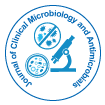

Opinion Article - (2023)Volume 7, Issue 1
Infections can be a significant threat to cancer patients, and can often impede effective cancer treatment. The growth of antibiotic resistance globally poses a risk of worsening the situation and impeding advancements in cancer treatment. Better multivariable models based on current understanding are required to treat and stop such infections.
A systematic review, privately sponsored, sought to examine the risk variables that have been studied and their relationship to death in multivariable models of resistant infection colonizations. Cancer patients are more likely to experience infectious illness complications, which often result in poorer outcomes than healthy individuals.
Autopsy studies suggest that infections may be a factor in more than half of all cancer patient deaths. A recent study also revealed that cancer patients are more likely to get infections caused by bacteria that are resistant to antibiotics.
Infections frequently force careers to delay or refuse effective cancer treatment, which may worsen the prognosis for cancer. The microbial ecology that causes illness, especially in hospitals, has undergone significant changes. Antimicrobial medications are no longer effective against bacteria and fungi, and it is predicted that more people in Europe alone now contract infections from resistant germs. The microbial spectrum is shifting, with an increasing number of species having a potential for inherent resistance, in addition to bacteria developing antimicrobial resistance. Resistant organisms are more frequently the source of infections in cancer patients, which poses a danger to the advancements in cancer therapy made in recent years.
Effective preventative strategies must be developed in addition to a compelling need to comprehend the evolving epidemiology of bacterial and fungal infections among cancer patients. Multivariable regression models that calculate and forecast the hazards linked to antimicrobial resistance in cancer treatment, such as the increased risk of mortality linked to resistance, need to be updated owing to the evolving epidemiology. It is crucial in this study to expand on already-existing multivariable models and and make use of variables that have previously been proved to be connected to the desired results. To enable the utilization of present knowledge in upcoming research, it is thus vital to map the literature that already exists on such multivariable models.
The systematic study sought to examine risk variables that have been considered in multivariable models of resistant infection colonization’s and accompanying mortality in cancer patients, using scientific techniques. Antibiotics, such as piperacillin tazobactam, methicillin methicillin, cephalosporin, carbapenem, aminoglycoside, gentamicin, amikacin, fluoroquinolone, linezolid, vancomycin, echinocandin, azole, and colistin, were among the words used to describe variations. Mechanisms of resistance or microbiological characteristics linked to resistance, such as beta-lactamase lactamase, extended-spectrum betalactamase lactamase, carbapenemase, biofilm-producing, and non-fermenting, were the terminology used.
The research population included only cancer patients of any age, sex, or ethnicity, whether haematological or otherwise. Not everyone in the research population has cancer, but it serves as a covariate or comparator. The model does not take into account medication resistance to antimicrobials. A resistant bacterial or fungal infection is either a risk factor or a result.
The risk variables were classified after classifying the microbial aetiology into five major categories: fungal, Clostridioides difficile, Gram-negative bacteria, Gram-positive bacteria, and various bacteria fungi. For each of the major microbial aetiology groups, a table has been generated showing how frequently certain risk factor types had been incorporated into the final multivariable model in the included studies. Statistical conclusions and summarizing which risk variables were clinically relevant were difficult or perhaps impossible due to methodological decisions that led to extremely different models.
The article highlights the threat of infections to cancer patients, which can impede effective cancer treatment and lead to poorer outcomes. With the rise of antibiotic resistance, the situation may worsen, making it crucial to develop better multivariable models that incorporate current understanding to treat and stop such infections. This discusses a systematic review that examined risk variables that have been studied and their relationship to death in multivariable models of resistant infection colonizations among cancer patients.
The review found that cancer patients are more likely to experience infectious illness complications, and infections may be a factor in more than half of all cancer patient deaths. The article emphasizes the need to comprehend the evolving epidemiology of bacterial and fungal infections among cancer patients, and develop effective preventative strategies. The study also highlights the need to update multivariable regression models that calculate and forecast the hazards linked to antimicrobial resistance in cancer treatment.
However, the article acknowledges that summarizing which risk variables were clinically relevant was difficult due to methodological decisions that led to different models. Overall, the article emphasizes the importance of addressing the threat of infections in cancer patients and developing effective strategies to mitigate the impact of antibiotic resistance.
Citation: Bryan S (2023) The Epidemiology of Bacterial and Fungal Infections among Cancer Patients is Changing Over Time. J Clin Microbiol Antimicrob. 7:147.
Received: 02-Feb-2023, Manuscript No. JCMA-23-22426; Editor assigned: 06-Mar-2023, Pre QC No. JCMA-23-22426 (PQ); Reviewed: 20-Mar-2023, QC No. JCMA-23-22426 (PQ); ; Revised: 28-Mar-2023, Manuscript No. JCMA-23-22426 (R); Published: 04-Apr-2023 , DOI: 10.35248/JCMA.23.7.147
Copyright: © 2023 Bryan S. This is an open-access article distributed under the terms of the Creative Commons Attribution License, which permits unrestricted use, distribution, and reproduction in any medium, provided the original author and source are credited.